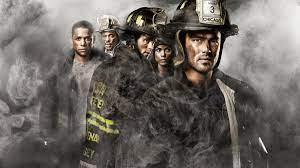
The Hearth Rekindled: Wallace Boden’s Return in Post Mortem, A Special Appearance Explained
"Chicago Fire" is more than just a television show; it's a family. And at the heart of that family is Chief Wallace Boden, a stoic leader, a steadfast mentor, and an unwavering source of moral compass. His presence resonates through Firehouse 51, shaping the culture and guiding its members through life-threatening emergencies and personal trials. So, when Boden left Firehouse 51 to become Deputy District Chief, a void was created, leaving fans and characters alike longing for his return. His special appearance in "Post Mortem" (MD07) wasn't just a fleeting cameo; it was a calculated and crucial narrative device, a reminder of the values Boden instilled and a subtle nudge towards the future of the firehouse.
Boden's absence in the day-to-day operations of Firehouse 51 allowed for a recalibration of dynamics. While the competent leadership of Captain Casey and Lieutenant Severide ensured smooth functionality, the subtle shift in atmosphere was palpable. There was a certain lack of the paternalistic guidance, the experienced wisdom that Boden provided. "Post Mortem" showcased this absence by highlighting the growing pains within the new team structure. New tensions arose, and old wounds resurfaced, all magnified by the pressure of the job and the weight of the recent loss of a firefighter.
Enter Boden, not as the everyday chief, but as the visiting Deputy District Chief investigating the aforementioned firefighter's death. His presence is immediately felt. The actors' body language shifts, their voices becoming more formal, hinting at the respect and reverence they hold for him. He's no longer just a colleague; he's a figure of authority, examining their procedures and challenging their actions. This distance, however, is precisely what makes his return in this capacity so powerful.
Boden's investigation wasn't just about uncovering the truth behind the firefighter's death; it was about holding his former colleagues accountable. He questioned their decisions, pushed them to confront their mistakes, and forced them to examine their own roles in the tragedy. This was a necessary process, not just for the investigation but for the firehouse as a whole. His objective distance allowed him to see the situation with clarity, identify the cracks in the foundation, and provide the necessary impetus for healing and growth.
The genius of the "Post Mortem" appearance lies in the way it emphasizes Boden's lasting influence. Even though he's no longer physically present, the values he instilled – loyalty, courage, and unwavering commitment to the team – are constantly referenced and ultimately serve as the guiding principles in resolving the conflict. The investigation, led by Boden's sharp intellect and decades of experience, ultimately exonerated the team, but more importantly, it forced them to confront their vulnerabilities and reaffirm their commitment to each other.
Furthermore, Boden's return foreshadowed a potential shift in the power dynamic within Firehouse 51. His presence reminded viewers and characters alike of his profound impact and leadership qualities. While he investigates the death, he implicitly reassures the audience that the firehouse is still in good hands, even without him physically leading the charge. This subtle reinforcement could be interpreted as preparing the audience for a future where Boden might have a diminished role, allowing younger characters to step up and fill his shoes.
In conclusion, Wallace Boden's special appearance in "Post Mortem" was far from a simple cameo. It was a carefully crafted narrative tool that served multiple purposes. It highlighted the void left by his absence, underscored the importance of his values, and served as a catalyst for growth and reflection within Firehouse 51. By investigating the firefighter's death, Boden not only sought justice but also reminded everyone of the standards he expects and the dedication he demands. It was a masterclass in writing and acting, seamlessly weaving a past presence into a present dilemma, and ultimately reminding us that even when physically absent, Wallace Boden's influence continues to shape the heart and soul of "Chicago Fire." He may no longer be the everyday chief, but his legacy remains a beacon, guiding Firehouse 51 through the flames, ensuring they remain, above all else, a family.
